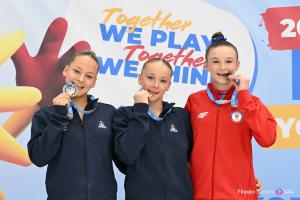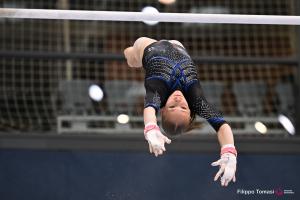This website uses cookies. By continuing to use our site you are agreeing to our use of cookies.
For more details about cookies and how to manage them see our privacy policy.
Interview: The impressive career of Fabian Hambüchen
Currently starring in the TV show ‘Let’s Dance’ in Germany, Fabian Hambüchen remains as popular -and well-known - as he was throughout his impressive competitive career. The 37-year-old legend sat down with us to go on a journey through his fabulous career, highs and lows.
That gymnastics runs through Hambüchen’s veins, is clear from his first steps into the gymnastics world: “My father was my coach. All those years. He was a gymnast himself. He once had the chance to go to the Olympics, in 1980 in Moscow. But the Western countries did the boycott, so he couldn’t go there unfortunately. He got motivated to go into coaching. My older brother was a gymnast too. When I grew up, I saw my dad in the gym, I saw my brother in the gym, so I wanted to do what my brother was doing. When I was four, I started gymnastics, not with my dad at that time, there was another coach who left after a year. Then my dad wondered what he should do with the kids. He picked the most talented ones, which I was not, as I wasn’t good at splits and stretching. But I did have the need to move all the time. So he took me to the other group, where my brother and all the older guys were. My goal then was to be as good as them. I was working really hard. When I was 8 years old, I watched the 1996 Olympics in Atlanta. For the first time, I understood how big and important the Olympics are for an athlete. That time a German gymnast, Andreas Wecker, won the gold medal on high bar. I told my mum that I will go to the Olympics and I will win the gold medal! I was 8, I had my mission and it motivated me every single day to get up and work as hard as I could.”
The bar was set from an early age, and it became clear quickly that Hambüchen had the talent and the work ethic to make it onto the highest level: “The most important thing for me was enjoying what I do, my love and my passion. Then, I started to have dreams, and follow these dreams, no matter what. At some point, I went to National Championships as a junior, and won. I felt really good, and I was much better than the other guys. First we had the compulsory routines, the same for everyone. Then, from 12, we competed a compulsory routine and our own one. At this point, I could already do high difficulty skills. I realized I was pretty good at what I do. As a junior, I made the national team for the first time. It was the U16 [Under 16] team which you can make from 12 years onwards. As I was only 11 years old, we asked for an exception because I was strong enough to make the German team. The French guys allowed me to compete, and in the end I won the all-around, already at 11. I was better than the 16 year olds. That was crazy! That’s what I like to do: being in first place, working hard. I thought about the next Olympics but that was Sydney 2000, only a year away and I would only be 12. At Athens 2004, I would be 16. So that Olympic dream came closer in my mind, and more realistic.”
Being so good at such a young age, could be daunting, but not for Hambüchen: “I was never the shy, quiet kid. I was always more open, direct, like a real kid playing around, being loud and having fun. I think I was more annoying for the older guys than that I was looking up to them. The difficulty was the difference between a 12 and a 16 year old in behaviour, in education. Honestly, there was not much we could talk about. We were always a really good team. Maybe that also was the reason that I grew up so fast, because I was always hanging out with older guys. I remember when I turned 16, in 2003, I made the senior team to compete at the World Championships. That was a crazy moment. All the other guys were at least 7 years older than me, most in their mid-twenties. Luckily, Thomas Andergassen took me by the hand and showed me how the things worked in the senior team. He was my mentor. Of course, there were a few others that were upset because I took a spot in the team at such a young age. As I was so good, it was a fair decision but some people couldn’t understand. Quite quickly people accepted me and my performance. Because I was not shy, I was always open for critics, open for discussions. I was junior European Champion in 2002 already. It was actually funny because I competed as a senior in the 2023 World Championships but then returned to the junior category for the 2024 Europeans. The head coach of the juniors, the head coach of the seniors and my dad decided together to let me compete as a junior for another year so that I could earn medals there, and someone else could get the spot in the senior team to prepare for the Olympics. That was a smart decision. I earned three gold medals, a silver and a bronze at the junior Europeans. In 2005, I was 17, and I won my first European title on high bar. We still had the final score of 10, then. So it was such a close fight in this final, every routine had to be perfect. And I hit my routine perfect, stuck the dismount, and I won, at 17. This is a really nice memory.”
For most athletes, competing in a major event on home soil is a wonderful experience. For Hambüchen, that moment came in Stuttgart, where the World Championships were held in 2007:
It was insane! Usually the gymnastics community is really small. Most of the time our competitions in Germany were held in small gyms, with maybe 1000 spectators. For Worlds in Stuttgart, the capacity was 9,000 people. We thought that the gym would be half full that would be a big success for German gymnastics. We were in the warm up hall and heard the crowd, it was so so loud! They had drums, they were singing. We thought ‘What the hell is going on there’. We went in the arena, it was completely packed, sold-out at 9,000 capacity. Adrenaline kicked in. It was amazing! I still get goosebumps when I talk about it.
"Every competition day, the gym was packed. It was a fantastic week. We won the bronze medal with the team which was the biggest success in men’s gymnastics in 20 years. I won silver in the all-around which was great. High bar final was my biggest goal and I had to compete as the last gymnast which is always really exciting. I got to do an even more difficult routine. It was a tactical decision to stick to the routine we had prepared most. It was the most difficult routine and no one else had the same D score. I hit it really clean and then I was World Champion, in front of my home crowd. It was one of the most emotional successes in my career.”
In his impressive career, a special place is taken by the Olympic Games. The pinnacle for each athlete, Hambüchen participated in an astonishing four editions for the Games: “My first Olympics were in Athens in 2004. I was 16, still a little kid. Everything was so exciting. I was so happy to move into the Olympic village, to feel this Olympic spirit. Just to be there, as an Olympic athlete. To be an Olympian. Besides the team final, I made it the all-around and the high bar final. Already at this young age which was a great success. In the all-around final I had no chance to get a medal. I was 23rd in the end I think. I had a mistake on pommel horse. But then I was in the top 10 athletes on high bar which was crazy as well because usually there are only 8 finalist. This time we were 10 because in qualifications places 7, 8, 9 and 10 all had exactly the same score: the same E[xecution]-score, the same D[ifficulty]-score. The first two days after qualifications they didn’t know how to separate these guys, and I was one of them. One day there was a final listed with 8 guys and I wasn’t listed. Another day there was another final listed with 8 guys where I was in the final. It was crazy, for days I didn’t know if I made it or not. Then the decision was made to allow all 10 in the high bar final which was really exciting. Gymnastics fans will definitely remember the situation around Alexey Nemov in the high bar final who did a crazy routine with 6 releases. The crowd went crazy, there was a standing ovation but the judges didn’t give him the score everyone was expecting. He was out of medal contention because he did a huge step on his dismount. The crowd did not understand. They started booing and held showed their thumbs down, like in the Ancient Greek / Roman times. It took 10 to 15 minutes. The judges changed the score but still not enough to win the gold. He was in bronze medal position then. Things calmed down a bit then. I remember I was coming out of the warm up gym and saw the routine of Nemov. Then I was just waiting there. In the beginning it made me more nervous. But then I started to laugh. I was enjoying it because it was such a great story. I went out there and did my routine. Unfortunately I also took a bigger step on my dismount, I placed seventh. So no medal. At first I was a bit disappointed but I realized quickly what I had achieved: an Olympic final at just 16! After that everything changed: media started to look at me intensively. Usually as the silver medallist you are the first loser. That’s how media thinks normally. But they were hyping up this seventh place, because between 1996 and 2004 German Gymnastics was dying. With me they had this hope that this young kid would get to the top for Germany again. Everything changed. I got popular in Germany. I got so many requests for TV shows etc. Fortunately I had good protection around me -my family, my friends- and we kept focusing on gymnastics, and not too much on this high society, glamour world. But what helped me the most after Athens: I got sponsorships! I did commercials and other things, which made me independent from everyone (federation, institution) because I earned my own money, I was able to focus just on gymnastics. And school! I still had three years of high school to do. I was hugely popular in the [gymnastics] world, in school I was just a normal guy. That helped me a lot to stay down to earth.”
Down to earth and focused, the Athens experience made way for Beijing, London and then ultimately to Rio: “That was a crazy journey. I had different experiences: standing there and being the best guy, but also failing and being disappointed. In Beijing [2008], I was the reigning World Champion, I was the guy that was supposed get several medals. Maybe 3, 4 medals. Maybe 2 golds. And I finished with just one bronze. It was a hell of a ride and I wasn’t that well prepared mentally. After Worlds in Stuttgart 2007 I had the attitude that I made it in front of my home crowd where the pressure was as high as it can possibility get. I’m strong enough to cope with 20,000 people in Beijing. I wasn’t focused on my mental training anymore, only on gymnastics. From a physical side, I was in my peak in Beijing. I never got in that kind of shape anymore. Just the mental aspect wasn’t there. I had a really hard time but I learned the most from those Olympics. When you get older, you overthink more. That was nice in Athens. I didn’t think too much, I was just going out there and having fun. Of course I was nervous, I was excited, but I never thought too much. Then 12 years later, I was overthinking every little detail, going back to my mental training whenever a little thing disturbed my training. Mindset was the biggest change. On the other hand, I had so much experience feeling how my body felt on any given day. I knew I could rely on it. I never had to struggle with my body. Because in this competition situation, you have so much power, you have so much adrenaline. You can prepare well, but that doesn't matter if you wake up that morning and you feel like shit. In the competition hall however, you know your body will do what you tell it to do. This comes with experience, becomes more natural year by year. In Rio, I was 28. I thought about a lot of things: my own expectations, and, like all athletes, the fear of failure. [The gold medal in Rio] was the completion of my career. The closing of the circle which started with the dream of becoming an Olympic Champion. It took me 20 years! I had this dream at 8, and then 20 years later I made it! I got the bronze in Beijing. I got the silver in London. I was World Champion. I was several times European Champion. I’ve won the World University Games. The European Games. I’ve won every title there is. Only Olympic gold was missing so that was fulfilling the dream. This moment was indescribable, amazing! I was screaming so loud my voice was gone afterwards. When I saw the last score come up, from Danell Leyva, and I knew that I got the gold, I couldn’t stop screaming. Whenever I had the chance I had my German flag up, and I was screaming again. It was crazy. Honestly, it still takes time to realise it. In this moment, you are just overwhelmed with feelings and emotions, especially when I was standing on the podium and I was listening to my national anthem, all the pictures were running in front of my eyes. The whole career: the ups, the downs, everything I was investing in this sport. That was a very special moment. Since then, and even now, I haven’t realized it yet for 100%. Whenever I do my speeches about motivation and mental strength, and I’m going through my career every time I get a bit closer to this realization of this Olympic gold. It’s still unbelievable that it worked out, in my very last international competition, after so many years fighting for this, after injuries, after rehab, after comeback.
This one moment made it all worth it: being resilient, keeping going, fighting. It was a real special and emotional moment for me
What an incredible moment in a phenomenal career. Danke Fabian!


